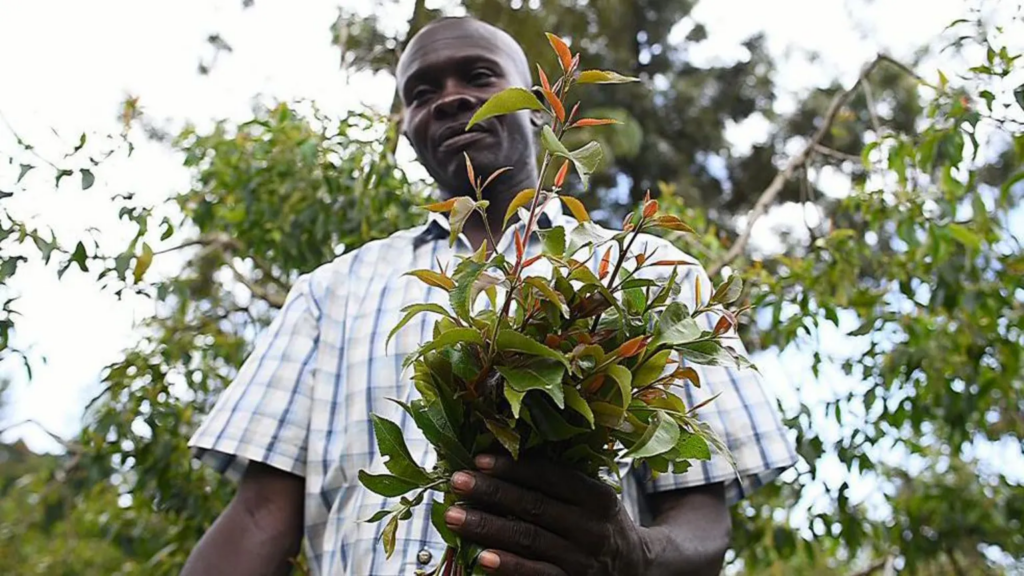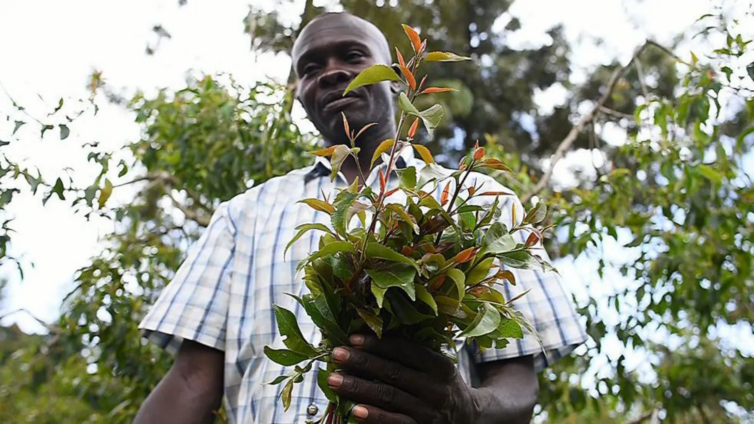Kenya's President William Ruto has reversed a contentious ban imposed in parts of the country on muguka, a variety of the popular stimulant known as khat or miraa.
The consumption of the freshly plucked buds and soft leaves has been blamed for a rise in mental health issues and increased social ills, including crime.
Three county governors from the coastal region banned its sale and use last week, sparking anger in the areas where the crop is grown.
President Ruto on Monday said the muguka crop was legal and its sale should not be prevented.
Muguka, a cheaper, more potent and addictive variety of the plant, is popular in the coastal counties of Mombasa, Kilifi, Taita Taveta and Kwale.
Last week, Mombasa Governor Abdulswamad Shariff Nassir banned the entry, transportation, sale and consumption of muguka citing its harmful effects, especially on young people.
Governor Nassir said more than half the people recovering in Mombasa rehabilitation centres were muguka addicts.
A similar directive was issued by the governors of Kilifi and Taita Taveta counties who vowed to crack down on its sale and use.

It sparked protests in the muguka-growing county of Embu, with farmers and traders decrying the risk of closing businesses due to the ban on the lucrative crop.
On Monday, President Ruto held a meeting with local leaders from Embu in an effort to end the muguka row.
“With muguka having been recognised by national legislation, any other laws or orders that contradict national legislation is null and void,” Mr Ruto said in a statement issued by the president's office.
President Ruto said muguka was a legal crop under the Crops Act 2013 and the Miraa Regulations 2023.
He said the government would allocate $3.7m (£3m) in this financial year to expand khat farming in the country.
Two activists had also challenged the muguka ban in court.
More than 10 traders were arrested last Friday in the main coastal city of Mombasa as the ban on the stimulant took effect, local media reported.
The ban had gained widespread support from religious organisations, with Muslim leaders in Mombasa calling for muguka to be categorised as a restricted drug.
Although the National Agency for the Campaign Against Drug Abuse has not banned muguka, it has classified it as a harmful substance based on the stimulants cathinone and cathine found in the plant.
"The amounts of cathinone and cathine are very high in muguka because you are chewing the leaves, where the potency resides," John Mututho, the former chief of the anti-drug abuse agency, told a local TV station.
He said the chemicals in muguka had impaired normal body functions.
"Let's invest in other herbs like rosemary. Farmers will be very rich, and we will not have zombies," Mr Mututho added.
Latest Stories
-
NPP will ensure a safer cleaner and greener environment – Dr Kokofu
57 seconds -
2024 Election: Police to deal with individuals who will cause trouble – IGP
2 mins -
Seychelles President’s visit rekindles historical and diplomatic ties with Ghana
8 mins -
Election 2024: EC destroys defective ballot papers for Ahafo and Volta regions
18 mins -
2024 Election: I am sad EC disqualified me, but I endorse CPP’s candidate – PNP’s Nabla
44 mins -
I want to build a modern, inclusive country anchored by systems and data – Bawumia to CSOs
45 mins -
Miss Health Ghana 2024: Kujori Esther Cachana crowned new Health Ambassador
53 mins -
Livestream: The manifesto debate on WASH and climate change
59 mins -
Alan Kyerematen saddened by NDC and NPP’s neglect of Krofrom Market in the Ashanti Region
1 hour -
CSIR Executive Director urges farmers to adopt technology for improved farming
1 hour -
Football Impact Africa’s Ghetto Love Initiative inspires change in Teshie
1 hour -
Peter Toobu calls for tighter border security over uncovered weapons at Tema Port
2 hours -
Gov’t has failed its commitment to IPPs – Ablakwa
2 hours -
Sell Chrome to end search monopoly, Google told
2 hours -
KATH to install seven new dialysis machines by end of November
2 hours

